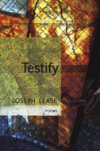Testify
To testify, in the Christian sense, is to tell the story of how one became a true Christian. In the legislative sense, to testify is to provide an account or evidence under oath in a court of law. In his new poetry collection, Testify, Joseph Lease seizes the cultural moment in which one’s testimony is as important as one’s identity, when testimony supersedes identity to the extent that it becomes identity. In our recent moment, we have seen America’s financial cornerstone crumble and watched those responsible (well, some of them, anyway) plead their ignorance and innocence interchangeably, while others have used religious belief systems to shake the very foundational elements of our nation.
To testify, in the Christian sense, is to tell the story of how one became a true Christian. In the legislative sense, to testify is to provide an account or evidence under oath in a court of law. In his new poetry collection, Testify, Joseph Lease seizes the cultural moment in which one’s testimony is as important as one’s identity, when testimony supersedes identity to the extent that it becomes identity. In our recent moment, we have seen America’s financial cornerstone crumble and watched those responsible (well, some of them, anyway) plead their ignorance and innocence interchangeably, while others have used religious belief systems to shake the very foundational elements of our nation.
Lease, however, redirects the language of admonition, guilt, and fear to more aesthetic purposes when he begins the opening long-poem:
America
Try saying wren.
It’s midnight
in my body, 4 a.m. in my body, breading and olives and cherries. Wait, it’s all rotten.
This, from the 15-page sequence, “America,” recalls the serial poem in Lease’s last book, “Free Again.” Both of these pay a great debt to Whitman and Ginsberg, but they are distinctly Lease’s own and they are his most powerful works.
Testify is Lease’s most far-reaching and clear-eyed work to date. It is a culmination of the poetic gestures and lyric voice he has been developing since The Room and it solidifies his position as one of the more striking voices of his generation. It’s a voice filled with anxiety—the anxiety we all, in some sense, have—and fixation: the fixation on Wall Street and prescription medication, government and the body as it ages…all of which are cause for at least a little panic. This is made evident later on in the book, in the sequence “Torn and Frayed”:
I felt like winter, I felt like Jell-O—we lost the word virtue,
we lost the word sister, two hundred years of dark garden—
it happens so fast—believe me (I know you won’t)—
and
You, you, you, you, you. Six when there’s mist in the street,
eight when your mouth starts to fade, nine when the drug
starts to work, two when you hate yourself more. Three
when you hate yourself more. Good old blank page. Slow
down, green whisper, dry whiskers, ordinary twilight, ordi-
nary, less hope. I wish I was Ezra Pound’s towel. America
you can’t be greed, America, you’re only greed, America,
one extra summer night—I wanted to (you know) feel like
a giant eyeball—
Perhaps it’s the pacing of these prozoid blocks—also some of the more discursive moments in Lease’s work—which makes them so evocative of the hyperactive way we now consume information, are force-fed information, and are subsequently overwhelmed by it. Unlike the television news and computer news and Facebook news—which isn’t really news—these poems shift between the barrage and more reflective lyric moments, each an echo:
We
Try to
Tell the
Truth
And rain
And wrens
And Blue
In fact, this collection is an echo chamber, its words and ideas recur throughout its ten poems, and I like that. I like that this is a book in the sense that Jack Spicer meant it. The poems talk to one another in an extended conversation, they are of one another but they shift and transform, always evolving with an eye on their origin.
There is only one instance of echoing in this book that I find to be explicitly problematic, and that’s the repetition of an entire section: “If birds / If // The sky / Is the / Sky // If birds / Tangle / Prayer // I / I’m.” It appears twice, verbatim, in “America” and such a lithe lyric moment—if it must appear twice—would better serve the book, were it to vary, even by one word, in diction. Were it intended to read as prayer, it might function more as such. Though there are other moments in the book that do successfully incorporate the phrasing associated with worship, this isn’t one. It’s a small issue to question, but because it works within the larger operating principle of this book, it’s worth mentioning. It’s my only real gripe in Lease’s otherwise overwhelmingly focused meditation.
Testify is, in a sense, Joseph Lease’s testimony of being an American in America at this precise moment in time. This is a document—a mantra even—which verges on the holy. There’s a sincerity in it that’s missing from a lot of recent work I’ve come across, and sincerity is something I find more and more compelling as the general thrust of contemporary post-avant verse careens away from the genuine via ironic deflection. Lease wants to hear the actual utterance when he tells us to:
say democracy: say free and responsible government, say
popular consent:
say a democracy so polarized, say polarized, say paralyzed:
say free and responsible government, say informed public,
say journalism, journalism, journalism—
Invoking the language of what is at stake forces us to participate in the discourse surrounding it—and this book tells us that our testimony, like its own, is necessary.





